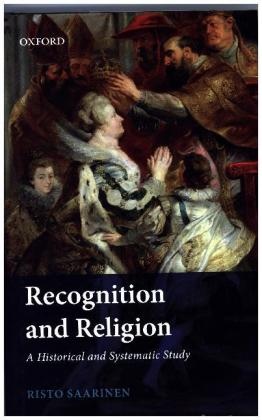Read more
Zusatztext Saarinen's new book is written for academic specialists in historical and systematic Christian theology; it may prompt interest in recognition among scholars of other religions, and of religious pluralism, as well ... the book's central claim -- that a theological mode of recognition exists independently of Hegel and that post-Hegelian philosophy is indebted to that tradition -- is a bold, very well-defended, and, I think, eminently defensible one ... Saarinen is very good at showing patterns of continuity and discontinuity in the treatment of religious recognition. His carefully structured prose, which is notably unadorned with stylistic flourishes, clearly shows significant variations among accounts of religious recognition. Informationen zum Autor Risto Saarinen is Professor of Ecumenics and Chair of Ecumenics at the University of Helsinki. Saarinen has published extensively in the fields of medieval and early modern philosophy and theology as well as contemporary ecumenism. He is the author of Weakness of Will in Renaissance and Reformation Thought (OUP, 2011). Klappentext This work considers the intellectual history of religious recognition. The concept is usually thought to begin with Hegel but this work takes a much broader sweep, moving from the New Testament to the modern day connecting the history of religion with philosophical approaches. Zusammenfassung This work considers the intellectual history of religious recognition. The concept is usually thought to begin with Hegel but this work takes a much broader sweep, moving from the New Testament to the modern day connecting the history of religion with philosophical approaches. Inhaltsverzeichnis List of Tables List of Abbreviations 1: Introduction 1.1 The Task 1.2 Philosophical Theories of Recognition 1.3 Recognition in Current Theology 1.4 Concepts, Conceptions, and Paradigms 1.5 Parts of Recognition 2: The Latin Traditions 2.1 From the New Testament to the Latin Recognitions 2.2 Augustine on Agnitio and Recognitio 2.3 Attachment, Feudalism, and Bernard of Clairvaux 2.4 Thomas Aquinas and Later Scholastics 2.5 Marsilio Ficino: Loving Recognition 2.6 Martin Luther: Justification and Attachment 2.7 Calvin and Religious Knowledge 3: The Modern Era 3.1 From Hobbes to Pietism 3.2 Anerkennung in Religion: Fichte and Spalding 3.3 Hegel and Schleiermacher 3.4 Cultural Protestantism and Dialectical Theology 3.5 Legal Developments 3.6 Vatican II and the Ecumenical Movement 4: Recognition in Religion: A Systematic Outline 4.1 The Emergence of Historical Paradigms 4.2 The Nature of Religious Recognition 4.3 Gift and Language 4.4 Recognizing Oneself 4.5 Conclusion: Ways and Aims of Recognition Sources and Literature Index ...

